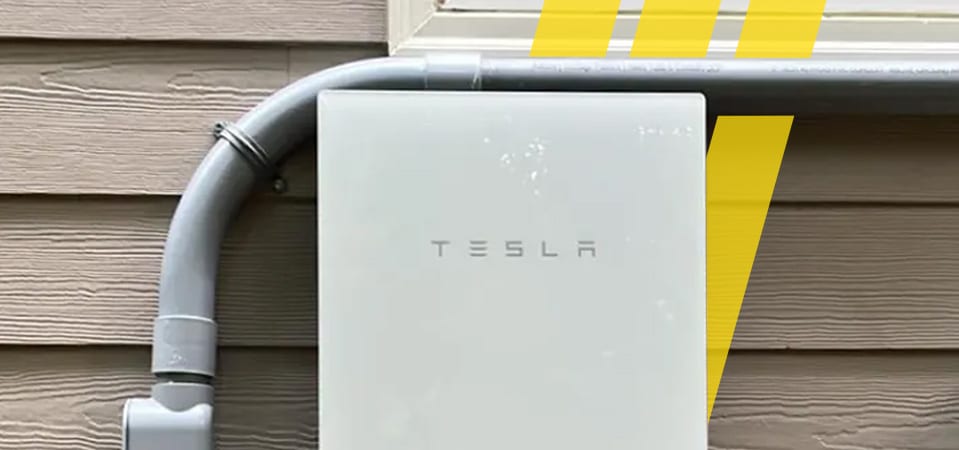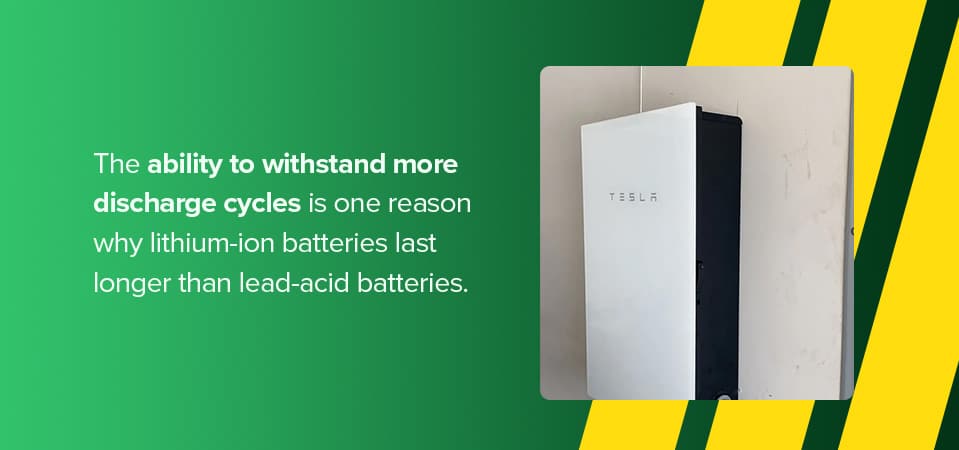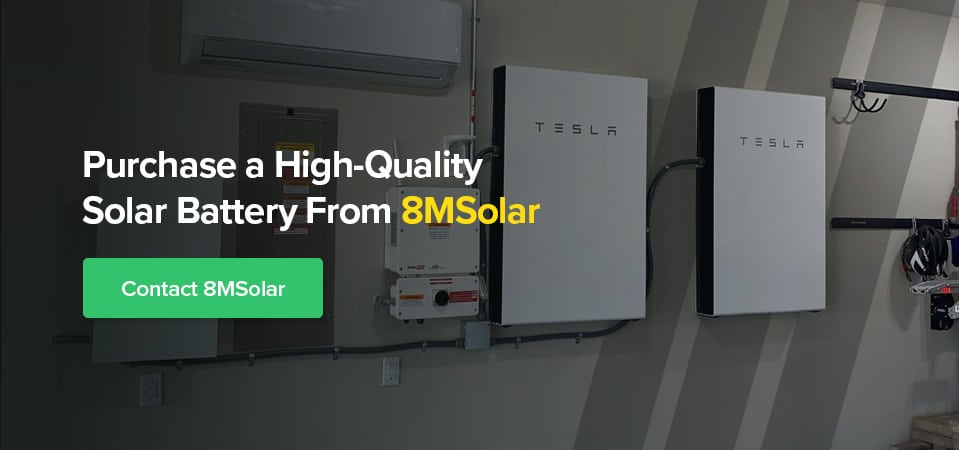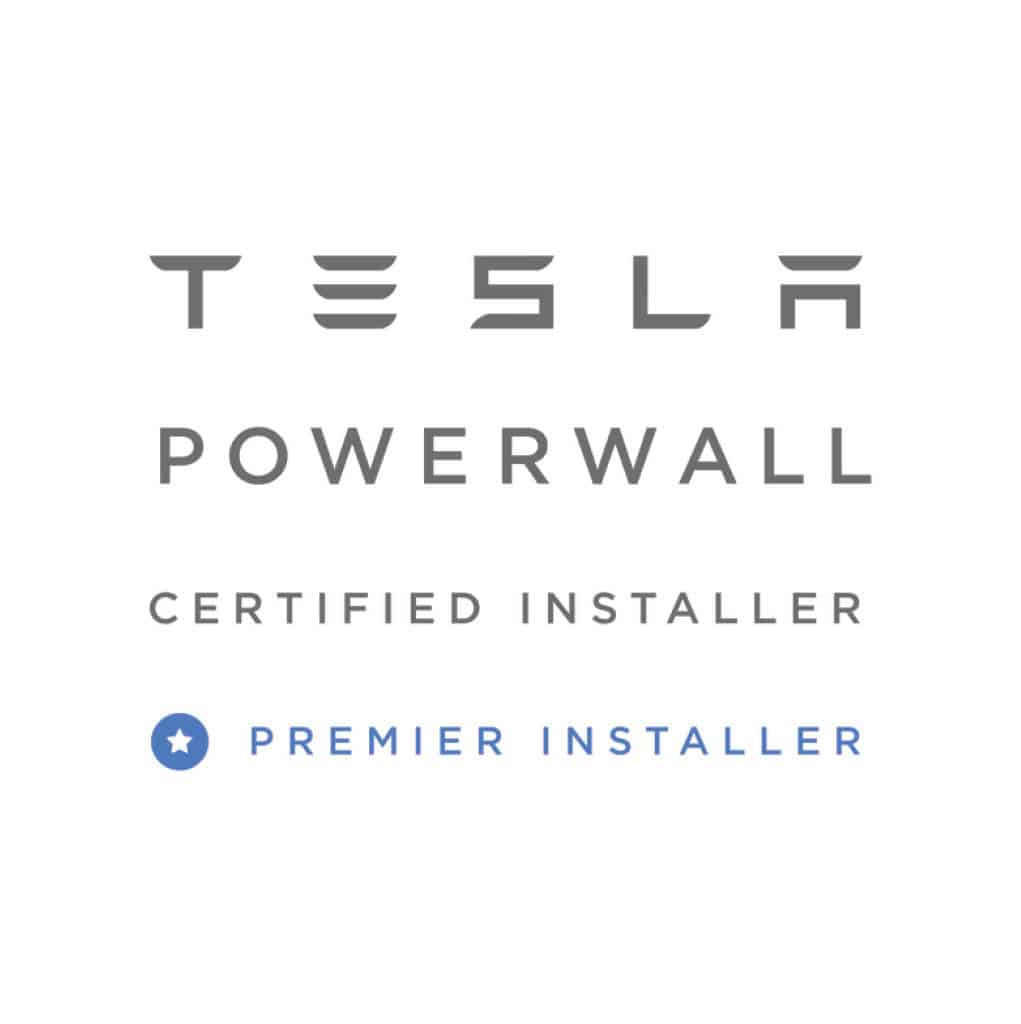
The life span of a solar battery determines how long you can store and use excess solar energy before purchasing a replacement. A solar battery’s type, depth of discharge, usage and temperature exposure significantly impact how long it can effectively operate in one cycle and how many cycles it can work total.
Understanding how long a solar battery lasts can help you choose the best battery for your home or business property’s needs.
Benefits of Solar Batteries
Supplementing your solar panel system with a battery backs your system up when you need additional power. A solar battery stores excess energy from a solar panel system so a home or business property can use it when the sun is not shining. This setup is also beneficial for the environment because it prevents you from using electricity from the power grid.
Installing a solar battery can help you save money on your electric bill because it provides energy on days solar panels absorb less sunlight and at night when sunlight is unavailable. It can also provide your home or business with energy during a power outage.
How Long Do Solar Batteries Last?
The amount of time a solar battery can provide power before needing to recharge depends on its power output, energy storage capacity and the appliances it powers. While most solar batteries do not supply the electricity to power an entire property, a solar battery can effectively power your most important appliances, such as your lights, refrigerator and internet router.
A battery’s kilowatt hours (kWh) determine how many kilowatts it can deliver to appliances before recharging. The amount of time it can last depends on each appliance’s wattage. Powering appliances with lower wattages allows a battery to operate longer than it would if it were powering appliances with higher wattages. Additionally, powering fewer appliances allows it to operate longer before needing to recharge.
How Long Is a Solar Battery Life Span?
The life span of a solar battery is around 10 to 15 years. Most solar battery warranties are for 10 years, but a battery may remain in good condition and last longer than its 10-year warranty. A solar battery’s exact life span depends on the following factors:
1. Type of Battery
The battery type a homeowner chooses also affects its life span. Solar battery types consist of the following:
- Lithium-ion batteries: Lithium-ion batteries typically cost more than lead-acid batteries, but they last longer. A lithium-ion battery typically lasts 10 to 15 years.
- Lead-acid batteries: Lead-acid batteries cost less than lithium-ion batteries, but their typical life span is four to eight years.
Lithium-ion batteries have a higher upfront cost than lead-acid batteries, but they provide a greater value. You can expect to replace lithium-ion batteries much less frequently than lead-acid batteries, saving you money long-term.
2. Usage
The number of times you use a battery significantly impacts how long it lasts. Similar to a phone battery, a solar battery’s life span lowers slightly with each usage cycle. A battery’s storage capacity decreases each time the battery drains, and each cycle slightly increases the frequency you need to recharge a battery.

The ability to withstand more discharge cycles is one reason why lithium-ion batteries last longer than lead-acid batteries. A lithium-ion battery can continue to operate effectively after more discharge cycles than a lead-acid battery.
Limiting battery usage allows it to maintain storage capacity and extend its life span. Using half of a battery’s capacity each day allows a battery to last longer than draining its full capacity daily.
3. Discharge
A solar battery’s depth of discharge (DoD) determines how much of its capacity it can discharge without taking on damage or shortening its life span. For example, a lithium-ion battery’s DoD is typically around 90%, allowing it to discharge 90% of its capacity without degradation. Some solar batteries contain built-in protection to prevent them from discharging 100% of their capacities.
4. Exposure
Extreme weather and temperatures can shorten a solar battery’s life span. Environmental conditions affect lithium-ion batteries less than lead-acid batteries, but protective storage can benefit both battery types.
While a lithium-ion battery can handle temperatures between zero degrees Fahrenheit and 90 degrees Fahrenheit, a lead-acid battery performs better and lasts longer when property owners store it between 40 and 80 degrees Fahrenheit. Installing energy storage in a temperature-controlled space such as a garage can help extend a battery’s life span.
5. Maintenance
Solar batteries require minimal maintenance, but monitoring your battery can help it last as long as possible. Checking your battery’s performance helps prevent damage so it can work properly over its entire life span.
Do Solar Panels Outlast Batteries?
Solar panels last longer than solar batteries do. Panels typically last about 25 to 30 years, and lead-acid batteries last between four and 15 years. Whether you use lithium-ion batteries or lead-acid batteries, you will need to replace your battery at least once to store energy throughout your solar panel system’s entire life span.
How to Maintain or Extend a Solar Battery’s Life Span
You can help your solar battery last as long as possible with the following tips:
- Install a high-quality battery: Installing a high-quality solar battery helps you get the best performance and extends the time you can use it before purchasing a replacement. Consider purchasing a lithium-ion battery for the longest use.
- Fully charge your solar battery: Allowing your battery to reach a full charge each cycle increases its longevity. All lead-acid batteries experience sulfation when they charge and desulfation when they are in use. Using an undersized battery bank helps ensure your batteries fully charge each cycle, preventing sulfate buildup and helping your battery remain in good condition for a longer time.
- Prevent a full discharge: Check your batteries to ensure they operate without fully discharging. A battery should only discharge its DoD capacity, so it should always recharge once it reaches this capacity. If you notice that your battery fully discharges, you may need to contact a professional to address damaged wires or cables. Choosing a battery with a low-voltage disconnect feature allows the battery to shut down before it drains completely.

Purchase a High-Quality Solar Battery From 8MSolar
The length of time you can depend on a solar battery largely depends on the type of battery you choose and its quality. 8MSolar offers high-quality solar batteries from brands such as LG and Tesla. The LG Chem features a 9.8 kWh storage capacity, and the Tesla Powerwall features a 13.5 kWh capacity.
These long-lasting batteries can power your home or business at night and during inclement weather to help you save money and reduce your carbon footprint. Contact 8MSolar to learn more about solar batteries and choose the best option to supplement your solar energy system.









